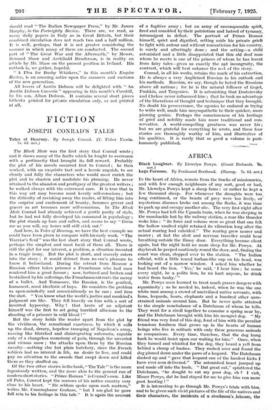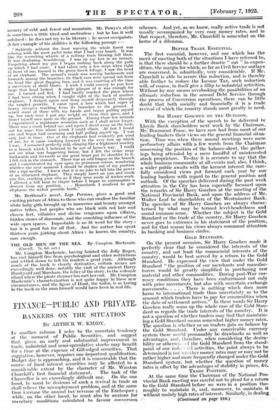AFRICA
Legs Parsons. By Ferdinand Berthoud. (Harrap. 7s. Od. net.)
IN the heart of Africa, remote from the tracks of missionaries, and with few enough neighbours of any sort, good or bad, Mr. Llewelyn Powys kept a sheep farm : or rather he kept a, few thousand sheep. For whenever the droughts were too,
long continued, or the beasts of prey were too lively, or mysterious diseases broke out among the flocks, it was time to pack up and occupy another site. The very first night after Mr. Powys had left the Uganda train, when he was sleeping in the ramshackle hut by the railway station, a roar like thunder
-Woke him : "its force and volume were so great that one felt
the hollow vaulted night retained its vibration long after the actual roaring had subsided." The roaring grew nearer and nearer ; at last the alert and nervous traveller could hear breathing outside the flimsy door. Everything became silent again, but the night held no more sleep for Mr. Powys. At daybreak he peeped cautiously round the door, and, finding the coast was clear, stepped over to the station. "The Indian' official, with a little round turban-like cap on his head, was looking out of a narrow window. I asked him whether he had heard the lion. Yes,' he said, 'I hear him ; he come every night, he a polite lion, he no hurt anyone, he drink water from tanky."
Mr. Powys soon learned to treat much graver dangers with equanimity ; as he needed to, indeed, when he was the one white man among a crowd of uncivilized native servants, with lions, leopards, boars, elephants and a hundred other unre- strained animals around him. But he never quite attained to the simple nonchalance of a Dutchman of whom he tells.
They went for a stroll together to examine a spring near by, and the Dutchman brought with him his mongrel dog. "My friend was very fond of this dog, fond of him with the peculiar tenacious fondness that grows up in the hearts of human beings who live in solitude with only these generous animals as companions. Every time, therefore, that the dog hung back he would insist upon our waiting for him." Once, when they turned and whistled for the dog, they heard a yell from behind a clump of bushes. They rushed over and found the dog pinned down under the paws of a leopard. The Dutchman dashed up and "gave that leopard one of the hardest kicks I have ever seen delivered." The astonished beast jumped up and made off into the bush. " Dat great cat," spluttered the Dutchman, "he dought to eat my poor dog, eh ? I vish, Misser Powys, dat he had stayed for me to give him von more goot booting ! "
It is interesting to go through Mr. Powys's trials with him, and to be given such vivid pictures of the life of the natives and their characters, the incidents sxf titockman'sjahours, the scenery of veld and forest and mountain. Mr. Powys's style is sometimes a little tired and motionless ; but he has it well subdued : he does not try to be literary ; he never overpaints. A fair example of his abilities is the following passage :— " Suddenly without the least warning the whole forest was echoing with the most awful noise that I had over heard. It was like the screeching whistle of a railway train blowing full blast. It was deafening, bewildering. I was on my feet in an instant. Forgetting about my gun I began rushing back along the path up which I had come. I had taken only a few steps when right in front of me, framed in the green forest foliage, I saw the head of an elephant. The animal's trunk was waving backwards and forwards among the branches, its black ears were spread out from its head like great flapping fans, and it was emitting all the time a succession of shrill blasts. I wish I could convey to you how large that head looked. A single glimpse of it was enough for me. I turned and fled. I had hardly reached the place where I had been sitting when I caught sight of the back of another elephant. I dodged again and flung myself desperately through the tangled growths. I came upon a tree which had ropes of heavy creepers reaching from its branches to the ground. I seized some of these with my hands and began pulling myself up, but each time I put any weight on them they gave, and I found myself once more on the ground. During those few seconds I experienced a nightmare sensation such as I shall never forget. There was a crash behind me, and again I dived away on the look- out for some tree whose trunk I could climb. At last I found one and began half swarming and half pulling myself up. I was only just in time. One of the elephants had evidently got wind of me, for it came crashing forward to the very tree up which I was. I remained perfectly still, clinging like a frightened monkey to a branch which I believed to be out of harm's way. I could not see what was happening below, but I felt the cedar sway backwards and forwards as the great beast put its shoulder to it. I felt sick in the stomach. There was an odd fungus on the branch and I concentrated my eyes upon its poisonous colour, wondering whether the next moment I should be shaken out of my position like a ripe medlar. I knew that it is no joke to fall into the power of an infuriated elephant. They simply kneel on you and crush you flat, cracking your ribs as if they were made of wicker-work. I allowed a full hour to elapse before I began to contemplate a descent from my position. . . . Henceforth I resolved to give elephants the widest possible berth."
Mr. Berthoud's novel, Legs Parsons, gives a good and exciting picture of Africa to those who can swallow the familiar white baby girls brought up to innocence and beauty amongst native tribes, lost peoples who are black with red hair and cloven feet, villainies and divine vengeance upon villains, hidden stores of diamonds, and the ennobling influence of the wide open spaces. Improbable is no fit word for the story : but it is good fun for all that. And the author has spent thirteen years jobbing about Africa : he knows the country, sure enough.











































 Previous page
Previous page